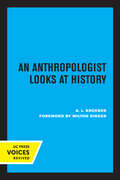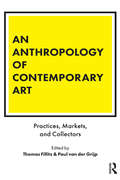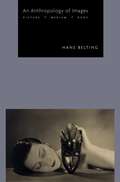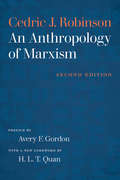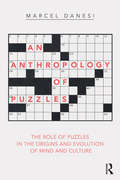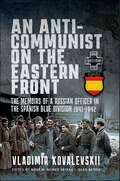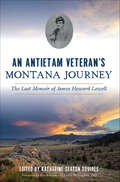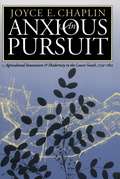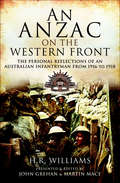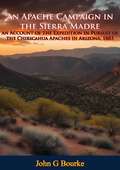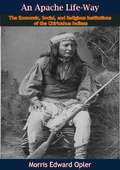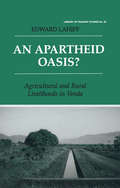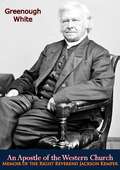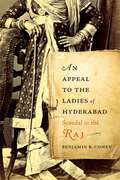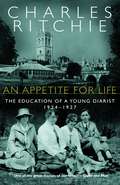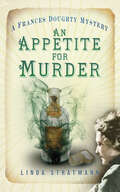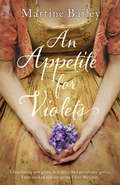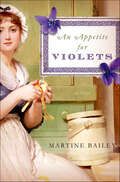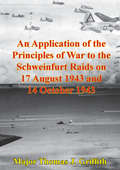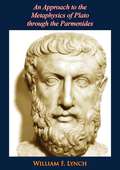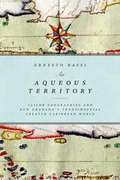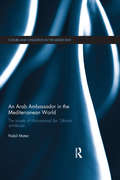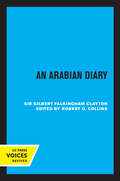- Table View
- List View
An Anthology of the New England Poetry from Colonial Times to the Present Day
by Louis UntermeyerThis is a magnificent collection of poetry. The editor features the famous along with such lesser-known poets as Edward Taylor, Jones Very, William Ellery Channing II, Frederick Goddard Tuckerman and Anne Bradstreet, the first female (and Puritan) poet to be published. Introductory comments are interesting. "Here Cain and Abel come to sacrifice; Fruits of the Earth and Fatlings each do bring: On Abel's gift the fire descends from Skies, But no such sign on false Cain's offering. With sudden hateful looks he goes his ways, Hath thousand thoughts to end his brothers days, Upon whose blood his future good he hopes to raise. Who fancies not his looks now at the Bar ? His face like death, his heart with horror fraught. No Malefactor ever felt like war When deep despair with wish of life hath fought. Branded with guilt and crusht with treble woes, A Vagabond to Land of Nod he goes; ..." (Bradstreet) "
An Anthropologist Looks at History
by A. L. KroeberThis title is part of UC Press's Voices Revived program, which commemorates University of California Press’s mission to seek out and cultivate the brightest minds and give them voice, reach, and impact. Drawing on a backlist dating to 1893, Voices Revived makes high-quality, peer-reviewed scholarship accessible once again using print-on-demand technology. This title was originally published in 1963.
An Anthropology of Contemporary Art: Practices, Markets, and Collectors (Criminal Practice Ser.)
by Thomas Fillitz Paul van der GrijpDrawing on the exciting developments that have occurred in the anthropology of art over the last twenty years, this study uses ethnographic methods to explore shifts in the art market and global contemporary art. Recognizing that the huge diversity of global phenomena requires research on the ground, An Anthropology of Contemporary Art examines the local art markets, biennials, networks of collectors, curators, artists, patrons, auction houses, and museums that constitute the global art world.Divided into four parts – Picture and Medium; World Art Studies and Global Art; Art Markets, Maecenas and Collectors; Participatory Art and Collaboration – chapters go beyond the standard emphasis on Europe and North America to present first-hand fieldwork from a wide range of areas, including Brazil, Turkey, and Asia and the Pacific.With contributions from distinguished anthropologists such as Philippe Descola and Roger Sansi Roca, this book provides a fresh approach to key topics in the discipline. A model for demonstrating how contemporary art can be studied ethnographically, this is a vital read for students in anthropology of art, visual anthropology, visual culture, and related fields.
An Anthropology of Images: Picture, Medium, Body
by Hans BeltingA compelling theory that places the origin of human picture making in the bodyIn this groundbreaking book, renowned art historian Hans Belting proposes a new anthropological theory for interpreting human picture making. Rather than focus exclusively on pictures as they are embodied in various media such as painting, sculpture, or photography, he links pictures to our mental images and therefore our bodies. The body is understood as a "living medium" that produces, perceives, or remembers images that are different from the images we encounter through handmade or technical pictures. Refusing to reduce images to their material embodiment yet acknowledging the importance of the historical media in which images are manifested, An Anthropology of Images presents a challenging and provocative new account of what pictures are and how they function.The book demonstrates these ideas with a series of compelling case studies, ranging from Dante's picture theory to post-photography. One chapter explores the tension between image and medium in two "media of the body," the coat of arms and the portrait painting. Another, central chapter looks at the relationship between image and death, tracing picture production, including the first use of the mask, to early funerary rituals in which pictures served to represent the missing bodies of the dead. Pictures were tools to re-embody the deceased, to make them present again, a fact that offers a surprising clue to the riddle of presence and absence in most pictures and that reveals a genealogy of pictures obscured by Platonic picture theory.
An Anthropology of Marxism (Race And Representation Ser.)
by Cedric J. RobinsonAn Anthropology of Marxism offers Cedric Robinson's analysis of the history of communalism that has been claimed by Marx and Marxists. Suggesting that the socialist ideal was embedded both in Western and non-Western civilizations and cultures long before the opening of the modern era and did not begin with or depend on the existence of capitalism, Robinson interrogates the social, cultural, institutional, and historical materials that were the seedbeds for communal modes of living and reimagining society. Ultimately, it pushes back against Marx's vision of a better society as rooted in a Eurocentric society, and cut off from its own precursors. Accompanied by a new foreword by H.L.T. Quan and a preface by Avery Gordon, this invaluable text reimagines the communal ideal from a broader perspective that transcends modernity, industrialization, and capitalism.
An Anthropology of Puzzles: The Role of Puzzles in the Origins and Evolution of Mind and Culture
by Marcel DanesiAn Anthropology of Puzzles argues that the human brain is a "puzzling organ" which allows humans to literally solve their own problems of existence through puzzle format. Noting the presence of puzzles everywhere in everyday life, Marcel Danesi looks at puzzles in society since the dawn of history, showing how their presence has guided large sections of human history, from discoveries in mathematics to disquisitions in philosophy. Danesi examines the cognitive processes that are involved in puzzle making and solving, and connects them to the actual physical manifestations of classic puzzles. Building on a concept of puzzles as based on Jungian archetypes, such as the river crossing image, the path metaphor, and the journey, Danesi suggests this could be one way to understand the public fascination with puzzles. As well as drawing on underlying mental archetypes, the act of solving puzzles also provides an outlet to move beyond biological evolution, and Danesi shows that puzzles could be the product of the same basic neural mechanism that produces language and culture. Finally, Danesi explores how understanding puzzles can be a new way of understanding our human culture.
An Anti-Communist on the Eastern Front: The Memoirs of a Russian Officer in the Spanish Blue Division 1941-1942
by Vladimir KovalevskiVladimir Kovalevskii’s memoirs record in graphic detail a remarkable military career. As a soldier, a committed anti-communist and Russian patriot he saw from the inside a series of conflicts that ravaged Europe in the first half of the twentieth century. In the First World War he fought the Germans, as a White Russian he opposed the Bolsheviks. He joined the French Foreign Legion and served in Africa before fighting for Franco in the Spanish Civil War and for Hitler in the Spanish Blue Division on the Eastern Front in the Second World War. His memoirs give a vivid insight into the armies he fought with and the causes he fought for – and they show how eventually the mental toll became so great that he was devoured by his own contradictions and the contradictions of his times. His experiences on the Eastern Front during the Second World War were shocking. He hoped the German campaign in the Soviet Union would liberate the Russian people, but after witnessing the grim suffering inflicted on the civilian population by a brutal occupying army he was deeply disillusioned and tormented by a sense of guilt. In the late 1940s, in order to make sense of his life as a soldier and to document the extraordinary sights he’d seen, he wrote these memoirs in Russian. They were buried in an archive for over seventy years, but they have now been edited, annotated and translated for this first English edition.
An Antietam Veteran's Montana Journey: The Lost Memoir of James Howard Lowell (Civil War Series)
by Katharine Seaton SquiresIn this recently unearthed memoir, Civil War veteran James Howard Lowell offers a firsthand account of his brutal journey west on a wagon train attacked by Indian Dog Soldiers. The Boston Yank staggers snow blind through a Laramie Plains blizzard to reach Salt Lake City, where he meets Brigham Young. In Montana, he joins an old forty-niner to work a mining claim, practices "tomahawk jurisprudence" in Fort Benton and builds a mackinaw to head downriver through Deadman Rapids to trade with the Crow and Gros Ventre tribes. Lowell's great-great-granddaughter edits this tale populated with colorful characters, narrow escapes and important historical events, such as the Baker Massacre. It features Lowell's letters to his sweetheart and Civil War correspondence.
An Anxious Pursuit
by Joyce E. ChaplinIn An Anxious Pursuit, Joyce Chaplin examines the impact of the Enlightenment ideas of progress on the lives and minds of American planters in the colonial Lower South. She focuses particularly on the influence of Scottish notions of progress, tracing the extent to which planters in South Carolina, Georgia, and British East Florida perceived themselves as a modern, improving people. She reads developments in agricultural practice as indices of planters' desire for progress, and she demonstrates the central role played by slavery in their pursuit of modern life. By linking behavior and ideas, Chaplin has produced a work of cultural history that unites intellectual, social, and economic history.Using public records as well as planters' and farmers' private papers, Chaplin examines innovations in rice, indigo, and cotton cultivation as a window through which to see planters' pursuit of a modern future. She demonstrates that planters actively sought to improve their society and economy even as they suffered a pervasive anxiety about the corrupting impact of progress and commerce. The basis for their accomplishments and the root of their anxieties, according the Chaplin, were the same: race-based chattel slavery. Slaves provied the labor necessary to attain planters' vision of the modern, but the institution ultimately limited the Lower South's ability to compete in the contemporary world.Indeed, whites continued to wonder whether their innovations, some of them defied by slaves, truly improved the region. Chaplin argues that these apprehensions prefigured the antimodern stance of the antebellum period, but she contends that they were as much a reflection of the doubt inherent in theories of progress as an outright rejection of those ideas.
An Anzac on the Western Front: The Personal Reflections of an Australian Infantryman from 1916 to 1918
by H.R. Williams&“A remarkably candid and graphic account&” of the World War I service of a member of the Australian and New Zealand Army Corps (Britain at War Magazine). Having enlisted in 1915 and serving in the 56th Battalion Australian Imperial Force, Harold Roy Williams arrived in France, from Egypt, on June 30, 1916. He describes the horrors of the Fromelles battlefield in shocking clarity and the conditions the troops had to endure are revealed in disturbing detail. Surviving a later gas attack, Harold Williams&’s subsequent postings read like a tour of the Western Front. Following the Somme, there was the mud and squalor of the line south of Ypres, the German Spring Offensive of 1918, the Battle of Amiens—frequently described as the most decisive battle against the Germans in France and Flanders—the capture of Villers-Bretonneux and, finally, the assault on Péronne. Injured at Péronne and invalided back to the United Kingdom, Williams survived the war to return to Australia in 1919. An Anzac on the Western Front is his vivid description of his service in the First World War—an account that was described as &“the best soldier&’s story . . . yet read in Australia&” when it was first published. &“Williams&’ experience was defined by his rise from private soldier to platoon commander and he confined his writing to it. This is a story of cold, hunger, injury, fear, humour, friendship and death . . . So bloody good.&” —War History Online
An Apache Campaign in the Sierra Madre: an Account of the Expedition in Pursuit of the Chiricahua Apaches in Arizona, 1883
by John G Bourke“With Crook in pursuit of Geronimo and his band.The author of this book was a U.S. soldier in addition to being a well known and highly regarded author on the Apache Wars of the later nineteenth century-in which he was an active participant. He maintained an interest, respect for and in some measure an affection for the Apaches and he also made a serious study of and wrote notable works on their customs and culture. He is perhaps best known for his classic account of the Apache Wars, 'On the Border with Crook.' This small account was written prior to his larger and more expansive work. It originally appeared as a series of articles in the Boston published 'Outing Magazine.' Bourke decided to bring his earlier writings back into print in book form, at a time when the Apaches had once again taken the war trail, to provide the American public with context to then current events. This fascinating account, which centres on the events of the Spring of 1883, concerns Crook's pursuit of the Chiricahua Apaches who broke out of San Carlos reservation to raid through Arizona and Mexico before vanishing into the fastness of the Sierra Madre. Those with any interest or knowledge in this subject will find themselves familiarly introduced to the corps of Apache Scouts, Al Sieber (Zieber), the scout and interpreter, Crook, Gatewood, Chato and of course the renowned Geronimo, as well as other names long associated with this remarkable time in the history of the Apaches and Arizona.”-Print ed.
An Apache Life-Way: The Economic, Social, and Religious Institutions of the Chiricahua Indians
by Morris Edward OplerA majority of ethnographer Morris Edward Opler’s research was done on Native American groups of the American Southwest. He studied specifically the Chiricahua Indians, who were the subjects of one of his most famous books, An Apache Life-Way: The Economic, Social, and Religious Institutions of the Chiricahua Indians. Opler studied many Native American groups, but the Apache were a main focus of his.An Apache Life-Way traces the life of an Apache year by year. Rather than a history, the book explains the day-to-day Apache experience, detailing the chronological order of one’s life. The lifestyle described in the book is from a time before the Americans started the long era of hostile interactions with the Apache.The people designated as “Apache” in this book are those who spoke the Apache language in the area that is now New Mexico, Arizona, Sonora, and Chihuahua. There were many smaller sub-groups that populated these areas, three of them different groups of the Chiricahua Apache.An Apache Life-Way is divided into several main parts: Childhood; Maturation; Social Relations of Adults; Folk Beliefs, Medical Practice, and Shamanism; Maintenance of the Household; Marital and Sexual Life; The Round of Life; Political Organization and Status; and Death, Mourning, and the Underworld. Each section is divided into more specific subcategories that explore each phase of life and the rituals associated with it.Originally published in 1941, An Apache Life-Way remains one of the most important and innovative studies of south-western Native Americans.“First-class...in the best ethnographic tradition. It fills a great gap in our anthropological knowledge and...deserves to be one of the most used of American tribal records.”—Ruth Benedict, author of Patterns of Culture
An Apartheid Oasis?: Agriculture and Rural Livelihoods in Venda
by Edward LahiffThis is a socio-economic study of agriculture and its contribution to livelihoods in Venda, one of the black "homelands" created in South Africa under apartheid. It is based on a survey of households in the Tshiombo irrigation scheme, a project in central Venda with around 600 plot-holders.
An Apostle of the Western Church: Memoir of the Right Reverend Jackson Kemper
by Greenough WhiteBishop (David) Jackson Kemper (1789-1870) was the first missionary bishop of the Episcopal Church in the United States of America. He was made a deacon of the Episcopal Church in 1811 and was ordained as a priest in 1814. In 1835, the Episcopal Church undertook to consecrate missionary bishops to preach the Gospel west of the settled areas, and Kemper was the first to be chosen. He promptly headed west. Having found that clergy who had lived all their lives in the settled East were slow to respond to his call to join him on the frontier, he determined to recruit priests from among men who were already in the West, and established a college in St. Louis, Missouri, for that purpose. He went on to found Nashotah House and Racine College in Wisconsin, and founded the mission parish that became the Cathedral Church of All Saints in Milwaukee. He constantly urged a more extensive outreach to the Native American peoples, and translations of the Scriptures and the services of the Church into their languages. From 1859 till his death in 1870, he was bishop of Wisconsin.-Print ed.
An Appeal to the Ladies of Hyderabad: Scandal in the Raj
by Benjamin B. CohenBenjamin Cohen tells the dramatic story of Mehdi Hasan and Ellen Donnelly, whose marriage convulsed high society in nineteenth-century India and whose notorious trial reverberated throughout the British Empire, setting the benchmark for Victorian scandals. In the struggle of one couple, he exposes the fault lines that would soon tear a world apart.
An Appetite for Life: The Education of a Young Diarist, 1924-1927
by Charles RitchieCharles Ritchie's first volume of diaries, The Siren Years, created a sensation when it was published in 1974. Besides winning the Governor General's Award for Non-fiction, it was hailed by reviewers on both sides of the Atlantic. An Appetite for Life, his second volume, first published in 1977, deals with his youth in Halifax and his career at Oxford - the years when Charles Ritchie turned from a callow, blundering youth into a callow, blundering young man.As these diaries show, Charles Ritchie had a sharp eye, a keen ear, a highly developed sense of the absurd, and - despite his unhappy knack of landing ?at on his face - a thorough "appetite for life." This is not only a hilariously funny book, but it presents a vivid picture of two worlds - Halifax and Oxford in the mid-twenties - that are now long gone. It also introduces us to an astonishing range of characters, but the most astonishing of all is the young Charles Ritchie himself.From the Trade Paperback edition.
An Appetite for Murder: A Frances Doughty Mystery 4
by Linda StratmannThe sudden death of overweight 49-year-old Thomas Whibley sparks off an acrimonious furore in Bayswater, and sparks fly between rival diet doctors, vegetarians and the extremist Pure Food Society. Young sleuth Frances Doughty is engaged to discover the author of anonymous libels, when a former colleague of Whibley’s, Hubert Sweetman, who has served fourteen years in prison for a violent robbery he claims he did not commit, asks her to trace his estranged family. Before she can start, however, the police arrive and arrest her client for the murder of his wife. There will be more murders and a vicious attack on Frances before she finally resolves a number of knotty questions. Is Hubert Sweetman really innocent? Where are his missing children? And who wielded the poisoned pen? The fourth book in the popular Frances Doughty Mystery series.
An Appetite for Violets
by Martine BaileyThat's how it is for us servants. No one pays you much heed; mostly you're invisible as furniture. Yet you overhear a conversation here, and add a little gossip there. A writing desk lies open and you cannot help but read a paper. Then you find something, something you should not have found.Irrepressible Biddy Leigh, under-cook at the foreboding Mawton Hall, only wants to marry her childhood sweetheart and set up her own tavern. But when her elderly master marries the young Lady Carinna, Biddy is unwittingly swept up in a world of scheming, secrets and lies.Forced to accompany her new mistress to Italy, Biddy takes with her an old household book of recipes, The Cook's Jewel, in which she records her observations. When she finds herself embroiled in a murderous conspiracy, Biddy realises that the secrets she holds could be the key to her survival - or her downfall . . .
An Appetite for Violets: A Novel
by Martine BaileyThat's how it is for us servants. No one pays you much heed; mostly you're invisible as furniture. Yet you overhear a conversation here, and add a little gossip there. A writing desk lies open and you cannot help but read a paper. Then you find something, something you should not have found.Irrepressible Biddy Leigh, under-cook at the foreboding Mawton Hall, only wants to marry her childhood sweetheart and set up her own tavern. But when her elderly master marries the young Lady Carinna, Biddy is unwittingly swept up in a world of scheming, secrets and lies.Forced to accompany her new mistress to Italy, Biddy takes with her an old household book of recipes, The Cook's Jewel, in which she records her observations. When she finds herself embroiled in a murderous conspiracy, Biddy realises that the secrets she holds could be the key to her survival - or her downfall . . .
An Appetite for Violets: A Novel
by Martine Bailey"That's how it is for us servants. No one pays you much heed; mostly you're invisible as furniture. Yet you overhear a conversation here, and add a little gossip there. Then you find something, something you should not have found."Irrepressible Biddy Leigh, under-cook at forbidding Mawton Hall, only wants to marry her childhood sweetheart and set up her own tavern. But when her elderly master marries young Lady Carinna, Biddy is unwittingly swept up in a world of scheming, secrets, and lies. Forced to accompany her new mistress to Italy, she documents her adventures and culinary discoveries in an old household book of recipes, The Cook's Jewel. Biddy grows intrigued by her fellow travelers, but her secretive and unconventional mistress is the most intriguing of all.In London, Biddy finds herself attracted to her mistress's younger brother. In France, she discovers her mistress's dark secret. At last in Italy, Biddy becomes embroiled in a murderous conspiracy, knowing the secrets she holds could be a key to a better life, or her downfall.Inspired by eighteenth-century household books of recipes and set at the time of the invention of the first restaurants, An Appetite for Violets is a literary feast for lovers of historical fiction. Martine Bailey's novel opens a window into the fascinating lives of servants, while also delivering a suspenseful tale of obsession and betrayal.
An Application Of The Principles Of War To The Schweinfurt Raids On 17 August 1943 And 14 October 1943
by Major Thomas J. GriffithThis monograph provides a historical look at the use of daylight precision bombing by American bombers against the ball-bearing factories at Schweinfurt, Germany, on 17 August 1943 and 14 October 1943. The principles of war from AFM 1-1, Basic Aerospace Doctrine of the United States Air Force, are used to analyze the strengths and weaknesses of the American and German efforts during these operations.
An Approach to the Metaphysics of Plato through the Parmenides
by William F. LynchA provocative and original interpretation of the Parmenides as constructive, positive metaphysics. By bringing together the speculative enthusiasm of the continental tradition with the more patient analysis of English scholarship Lynch has opened up a new line of inquiry and discussion.--R. S. B.in Review of Review of Metaphysics 13
An Aqueous Territory: Sailor Geographies and New Granada's Transimperial Greater Caribbean World
by Ernesto BassiIn An Aqueous Territory Ernesto Bassi traces the configuration of a geographic space he calls the transimperial Greater Caribbean between 1760 and 1860. Focusing on the Caribbean coast of New Granada (present-day Colombia), Bassi shows that the region's residents did not live their lives bounded by geopolitical borders. Rather, the cross-border activities of sailors, traders, revolutionaries, indigenous peoples, and others reflected their perceptions of the Caribbean as a transimperial space where trade, information, and people circulated, both conforming to and in defiance of imperial regulations. Bassi demonstrates that the islands, continental coasts, and open waters of the transimperial Greater Caribbean constituted a space that was simultaneously Spanish, British, French, Dutch, Danish, Anglo-American, African, and indigenous. Exploring the "lived geographies" of the region's dwellers, Bassi challenges preconceived notions of the existence of discrete imperial spheres and the inevitable emergence of independent nation-states while providing insights into how people envision their own futures and make sense of their place in the world.
An Arab Ambassador in the Mediterranean World: The Travels of Muhammad ibn ‘Uthmān al-Miknāsī, 1779-1788 (Culture and Civilization in the Middle East)
by Nabil MatarThis book provides translated selections from the writings of Muhammad Ibn Othman al-Miknasi (d. 1799). The only writings by an Arab-Muslim in the pre-modern period that present a comparative perspective, his travelogues provide unique insight with in to Christendom and Islam. Translating excerpts from his three travelogues, this book tells the story of al-Miknasi’s travels from 1779-1788. As an ambassador, al-Miknasi was privy to court life, government offices and religious buildings, and he provides detailed accounts of cities, people, customs, ransom negotiations, historical events and political institutions. Including descriptions of Europeans, Arabs, Turks, Christians (both European and Eastern), Muslims, Jews, and (American) Indians in the last quarter of the eighteenth century, An Arab Ambassador in the Mediterranean World explores how the most travelled Muslim writer of the pre-modern period saw the world: from Spain to Arabia and from Morocco to Turkey, with second-hand information about the New World. Supplemented with extensive notes detailing the historic and political relevance of the translations, this book is of interest to researchers and scholars of Mediterranean History, Ottoman Studies and Muslim-Christian relations.
An Arabian Diary
by Sir Gilbert ClyatonThis personal diary of six months of diplomacy and travel in Arabia represents and impressive document to the quiet ability and resourcefulness of one of Great Britain's leading officials in the Middle East in the 1920's. The sudden expansion of the Arabian Sultanate of Najd under the leadership of 'Abd-al-'Aziz ibn Sa'ud after the First World War presented a clear danger to British interests in the Middle East and threatened the strategically important Arabian corridor to India. To resolve this project the British government selected Sir Gilbert Clayton as their envoy to negotiate a settlement of differences and to determine the frontier between Saudi Arabia and the British Mandates of Trans-Jordan and Iraq. Sir Gilbert Falkingham Clayton (1875-1929) was a quiet, able soldier, administrator, and diplomat who had come out to eh Middle East during the reconquest of the Sudan and remained as a political officer in theSudan service, secretary to the Governor-General of the Sudan, Sir Reginald Wingate, and finally the Sudan agent at Cairo. At the outbreak of the First World War, Clayton served as the director of Military Intelligence an forged that remarkable intelligence team which included among others Leonard Woolley, George Lloyd, and T.E. Lawrence. Experience and resourceful, Clayton was an obvious choice to travel to the tents of Iban Sa'ud where the autumn of 1925 he negotiated the Bahra and Hadda Agreements fixing the frontiers of Saudi Arabia with Trans-Jordan and Iraq and cementing friendship between Britain and Ibn Sa'ud. These results represent a brilliant triumph of personal diplomacy which protected British interests and inaugurated the lifelong friendship between Sir Gilbert and Ibn Sa'ud. The story of these negotiations and Sir Gilbert's subsequent mission to the Imam of Yemen as the first official representative of the British government to visit San'a' are told in this valuable historical diary. This title is part of UC Press's Voices Revived program, which commemorates University of California Press's mission to seek out and cultivate the brightest minds and give them voice, reach, and impact. Drawing on a backlist dating to 1893, Voices Revived makes high-quality, peer-reviewed scholarship accessible once again using print-on-demand technology. This title was originally published in 1969.

